
Find Help
More Items From Ergsy search
-

What non-surgical treatments are available for Carpal Tunnel Syndrome?
Relevance: 100%
-

Carpal Tunnel Syndrome
Relevance: 90%
-
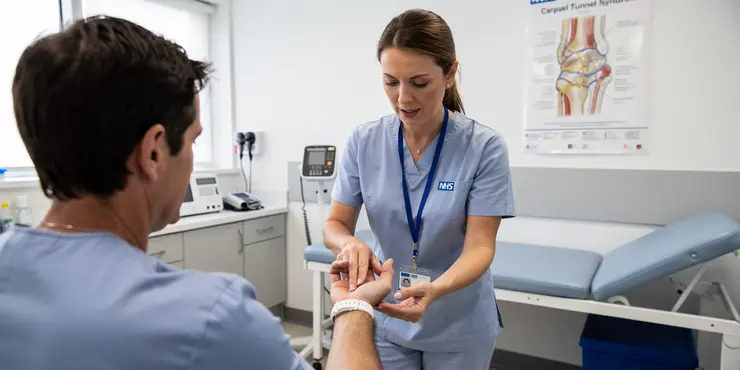
Is Carpal Tunnel Syndrome covered by the NHS?
Relevance: 85%
-

Can Carpal Tunnel Syndrome recur after treatment?
Relevance: 81%
-

What is Carpal Tunnel Syndrome (CTS)?
Relevance: 78%
-

Are there any alternative treatments for Carpal Tunnel Syndrome?
Relevance: 78%
-

When should I consider surgery for Carpal Tunnel Syndrome?
Relevance: 76%
-
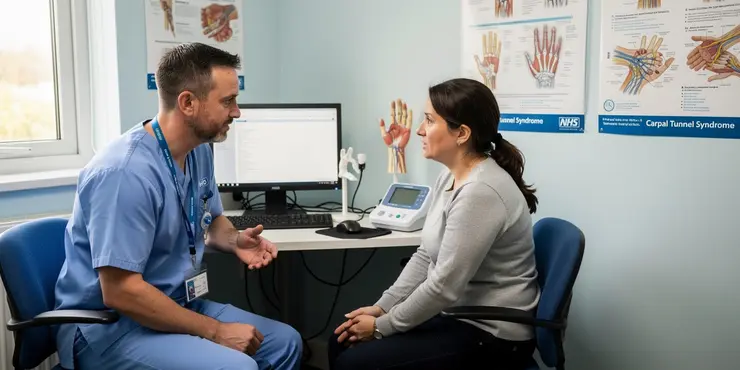
What causes Carpal Tunnel Syndrome?
Relevance: 76%
-
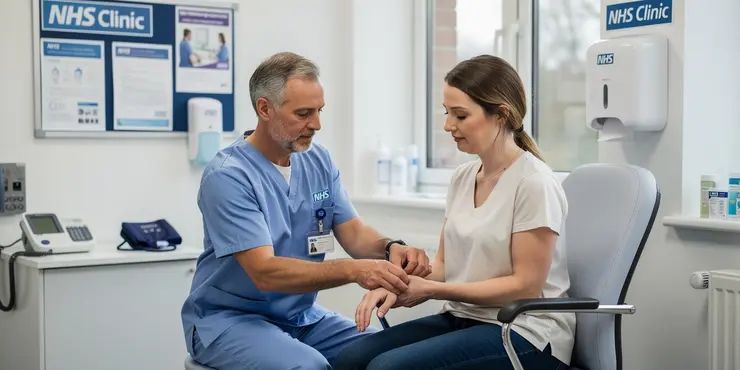
How is Carpal Tunnel Syndrome diagnosed?
Relevance: 75%
-
How can I prevent Carpal Tunnel Syndrome?
Relevance: 71%
-

What does Carpal Tunnel Syndrome surgery involve?
Relevance: 71%
-
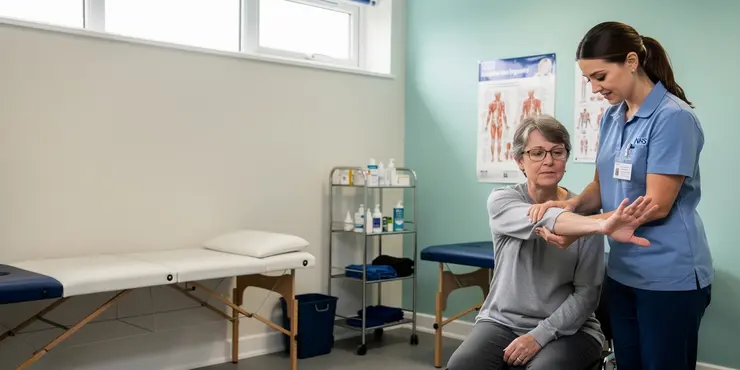
Are there specific exercises that can help with Carpal Tunnel Syndrome?
Relevance: 69%
-

Can I work or continue sports activities if I have Carpal Tunnel Syndrome?
Relevance: 69%
-

What are the common symptoms of Carpal Tunnel Syndrome?
Relevance: 63%
-

Can lifestyle changes help manage Carpal Tunnel Syndrome?
Relevance: 61%
-

What is the recovery time after Carpal Tunnel Surgery?
Relevance: 50%
-

Are non-surgical facelifts effective?
Relevance: 35%
-

What is Cushing's syndrome?
Relevance: 23%
-

Munchausen's syndrome | NHS
Relevance: 23%
-

Prader-Willi Syndrome | NHS
Relevance: 22%
-
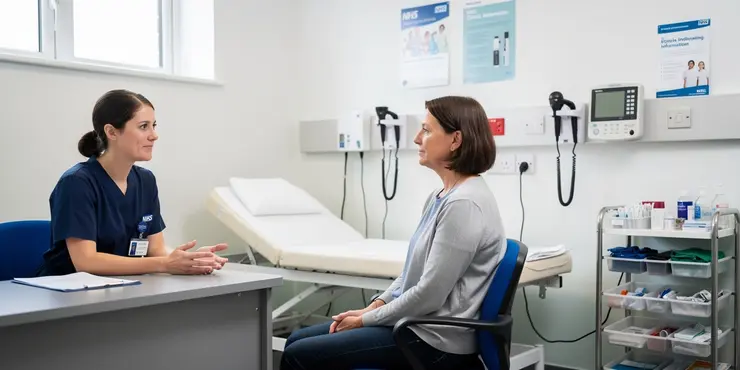
What is complex sleep apnea syndrome?
Relevance: 21%
-

Charles Bonnet Syndrome
Relevance: 21%
-

Turner syndrome: Beyond the classic XO phenotype
Relevance: 21%
-

Is chronic fatigue syndrome contagious?
Relevance: 21%
-

What is complex sleep apnea syndrome?
Relevance: 21%
-

What causes chronic fatigue syndrome?
Relevance: 20%
-
What is chronic fatigue syndrome?
Relevance: 20%
-
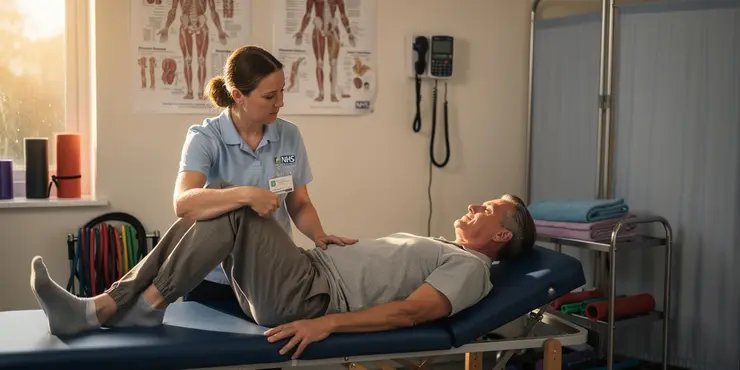
Exercises for sciatica: piriformis syndrome | NHS
Relevance: 20%
-

What is congenital rubella syndrome?
Relevance: 20%
-

Greater trochanteric pain syndrome
Relevance: 19%
-
Is chronic fatigue syndrome a mental illness?
Relevance: 19%
-

Having a child with Down's syndrome | NHS
Relevance: 19%
-

Down's syndrome: Emily's story | NHS
Relevance: 19%
-

What role do infections play in chronic fatigue syndrome?
Relevance: 19%
-

Having a child with Edwards' syndrome (trisomy 18) | NHS
Relevance: 19%
-

Building Understanding and Supporting Your Child with Tourette’s Syndrome/Tics
Relevance: 19%
-

Are there psychological aspects to chronic fatigue syndrome?
Relevance: 18%
-

What is the difference between autism and Asperger's syndrome?
Relevance: 18%
-

How is chronic fatigue syndrome treated?
Relevance: 18%
-

What is irritable bowel syndrome (IBS)?
Relevance: 17%
Introduction to Carpal Tunnel Syndrome
Carpal Tunnel Syndrome (CTS) is a common condition that causes pain, numbness, tingling, or weakness in the hand and arm. It occurs when the median nerve, which runs from the forearm into the palm of the hand, becomes compressed at the wrist. Non-surgical treatment options are often effective, particularly when the condition is diagnosed early. These treatments aim to relieve the pressure on the median nerve and alleviate symptoms.
Wrist Splinting
One of the primary non-surgical treatments for Carpal Tunnel Syndrome is wrist splinting. This involves wearing a splint or brace that keeps the wrist in a neutral position, especially during the night. Splints prevent excessive flexion or extension of the wrist, which can exacerbate symptoms. By keeping the wrist in a straight and relaxed position, splints help relieve pressure on the median nerve and promote healing. This treatment is widely recommended for individuals with mild to moderate symptoms.
Activity Modification
Modifying daily activities to reduce stress on the wrist can be highly beneficial for individuals with Carpal Tunnel Syndrome. This may involve altering the way tasks are performed, taking regular breaks from repetitive activities, or employing ergonomic equipment to reduce strain. For example, using an ergonomic keyboard and mouse can significantly decrease wrist strain for those who spend extensive time on the computer. Activity modification is a simple yet effective approach to managing symptoms and preventing further aggravation of the condition.
Physical Therapy
Physical therapy exercises can help alleviate symptoms of Carpal Tunnel Syndrome by strengthening the muscles of the hand and wrist and improving flexibility. A physical therapist may recommend specific exercises that focus on stretching and strengthening the wrist and hand muscles, which can help reduce nerve compression and promote nerve gliding. The therapist might also provide guidance on posture and optimal hand movements to minimize stress on the wrist.
Medications
Medications such as nonsteroidal anti-inflammatory drugs (NSAIDs) can help reduce pain and inflammation associated with Carpal Tunnel Syndrome. Though they do not address the underlying cause, they can provide temporary relief from symptoms. Additionally, corticosteroid injections may be administered by a healthcare professional to decrease inflammation and swelling around the median nerve, providing significant short-term relief for more severe symptoms.
Conclusion
For many individuals, non-surgical treatments can effectively manage Carpal Tunnel Syndrome and improve quality of life. Early intervention with methods such as wrist splinting, activity modification, physical therapy, and medications can substantially reduce symptoms and prevent progression. It is crucial for individuals experiencing symptoms of Carpal Tunnel Syndrome to seek medical advice promptly to determine the most appropriate treatment strategy tailored to their specific needs. Always consult with healthcare professionals before beginning any treatment regimen.
Introduction to Carpal Tunnel Syndrome
Carpal Tunnel Syndrome (CTS) makes your hand and arm hurt, feel numb, tingle, or weak. It happens when a nerve in your wrist is under pressure. This nerve is called the median nerve. We can often fix it without surgery, especially if we catch it early. These treatments help take the pressure off the nerve and make you feel better.
Wrist Splinting
Wrist splinting is a way to help Carpal Tunnel Syndrome. You wear a splint or brace on your wrist to keep it straight. You should wear it at night. The splint stops your wrist from bending too much. This bending can make the pain worse. Keeping your wrist straight helps the nerve heal and reduces pain. Splints are good for people with mild or moderate symptoms.
Activity Modification
Changing how you do things every day can help your wrist. This means doing tasks differently, taking breaks from using your hands too much, or using special tools that are good for your wrist. For example, using a special keyboard and mouse can help if you use a computer a lot. Changing these activities can stop the pain from getting worse.
Physical Therapy
Physical therapy includes exercises for the hand and wrist. A therapist can show you exercises that make your hand and wrist stronger and more flexible. These exercises help the nerve move better and reduce pressure. The therapist can also teach you how to sit and move your hands in a way that is easier on your wrists.
Medications
Medicines like NSAIDs can help with pain and swelling. They don’t fix the main problem, but they help you feel better for a while. Doctors can also give you injections to reduce swelling and pain for a short time, especially if your symptoms are bad.
Conclusion
Many people can manage Carpal Tunnel Syndrome without surgery and feel better. Using splints, changing activities, doing exercises, and taking medicine early can help. If you have symptoms, it is important to see a doctor to find out what is best for you. Always talk to a healthcare professional before starting any treatment.
Frequently Asked Questions
What is Carpal Tunnel Syndrome?
Carpal Tunnel Syndrome (CTS) is a condition caused by pressure on the median nerve, which runs through the wrist's carpal tunnel, leading to pain, numbness, and tingling in the hand and arm.
What are non-surgical treatments for Carpal Tunnel Syndrome?
Non-surgical treatments include wrist splinting, activity modifications, physical therapy, medications, and steroid injections.
How do wrist splints help with Carpal Tunnel Syndrome?
Wrist splints keep the wrist in a neutral position, reducing pressure on the median nerve and often worn at night to prevent symptoms.
Can lifestyle changes impact Carpal Tunnel Syndrome?
Yes, reducing repetitive hand movements, taking frequent breaks, and using ergonomic tools can help relieve symptoms.
What role does physical therapy play in treating Carpal Tunnel Syndrome?
Physical therapy involves exercises that improve wrist strength and flexibility, potentially reducing symptoms of CTS.
Which medications are used for Carpal Tunnel Syndrome?
Nonsteroidal anti-inflammatory drugs (NSAIDs) and sometimes corticosteroids are used to reduce pain and inflammation.
How do corticosteroid injections help Carpal Tunnel Syndrome?
Corticosteroid injections can reduce inflammation and swelling, providing relief from symptoms.
Are there alternative therapies for Carpal Tunnel Syndrome?
Some patients find relief with alternative therapies such as acupuncture, yoga, or chiropractic care.
Is ergonomic equipment effective for Carpal Tunnel Syndrome?
Yes, ergonomic equipment can reduce strain on the wrist and hand, easing symptoms of CTS.
Can stress relief help with Carpal Tunnel Syndrome?
Yes, stress management techniques can sometimes help manage overall pain and discomfort levels.
Does diet affect Carpal Tunnel Syndrome?
While no direct link, a healthy diet can support overall nerve health and reduce inflammation.
How effective are home remedies for Carpal Tunnel Syndrome?
Home remedies like hand exercises, wrist shakes, or cold compresses can offer temporary relief.
Can hand exercises alleviate Carpal Tunnel Syndrome symptoms?
Yes, specific hand and wrist exercises can help relieve pressure and improve flexibility.
Is massage therapy beneficial for Carpal Tunnel Syndrome?
Massage therapy can help reduce tension and improve circulation in the wrist and hand.
Are there any vitamins or supplements that help with Carpal Tunnel Syndrome?
Vitamin B6 and magnesium are sometimes suggested to support nerve health, but their effectiveness is not conclusively proven.
Can ice and heat therapies relieve Carpal Tunnel Syndrome?
Yes, applying ice can reduce swelling, and heat can relax and soothe stiff muscles.
How long does non-surgical treatment for Carpal Tunnel Syndrome usually take?
Treatment duration varies, but some patients experience improvement within weeks to months.
Is it possible to fully recover from Carpal Tunnel Syndrome without surgery?
Many people find significant relief with non-surgical treatments, but recovery can depend on severity and duration of the condition.
What is the first step in non-surgical treatment for Carpal Tunnel Syndrome?
The initial step is usually to modify activities that exacerbate symptoms and use wrist splints, especially at night.
When should someone with Carpal Tunnel Syndrome see a doctor?
If symptoms persist despite home treatments or significantly affect daily activities, consulting a doctor is advisable.
What is Carpal Tunnel Syndrome?
Carpal Tunnel Syndrome is when your hand and fingers feel tingly or weak. It's because a nerve in your wrist is getting squeezed.
Here are some ways to make you feel better:
- Rest your hand often.
- Try some gentle hand exercises.
- A doctor can give you a special wrist brace to wear.
If you're having trouble reading, you can:
- Ask someone to read it out loud to you.
- Use a tool on your computer or phone that reads text out loud.
- Break the text into smaller parts and read slowly.
Carpal Tunnel Syndrome (CTS) is when a nerve in your wrist gets squeezed. This can make your hand and arm hurt, feel numb, or tingle like pins and needles.
What Can Help Carpal Tunnel Without Surgery?
Carpal tunnel can hurt your hand or wrist. Here are some ways to help it without surgery:
- Rest: Give your hand a break. Try not to use it too much.
- Wrist Splints: Wear a special wrist brace, especially at night.
- Exercises: Do gentle hand and finger stretches.
- Cool Packs: Put a bag of ice on your wrist to help with pain.
- Hand Therapy: Visit a therapist to learn hand exercises.
Ask someone to help you if it's hard to do these things. You can also use voice commands on your phone or computer if typing hurts.
There are many ways to help without surgery:
- Wearing a wrist brace
- Changing how you use your hand
- Doing hand exercises
- Taking medicine
- Getting a special shot from the doctor
How do wrist splints help with Carpal Tunnel Syndrome?
A wrist splint is a special support for your wrist.
Carpal Tunnel Syndrome can make your hand hurt or feel tingly.
Wearing a wrist splint keeps your wrist straight.
This can help your hand feel better.
Some people wear wrist splints at night.
Ask a doctor if a wrist splint can help you.
You can also use apps or talk to someone for more help.
Wrist splints help hold your wrist straight. This can stop it from pressing on important nerves in your wrist. People often wear wrist splints at night to help stop pain.
Can changing how you live help Carpal Tunnel Syndrome?
Carpal Tunnel Syndrome is when your hand and fingers feel numb or tingly. It happens because a nerve in your wrist is squeezed.
Here are some ways changing your lifestyle might help:
- Rest your hands: Take breaks if you use your hands a lot.
- Stay healthy: Exercise and eat healthy foods to keep your body strong.
- Stretch: Try easy hand and wrist exercises.
- Tools: Use tools like wrist braces to support your hands.
Talk to a doctor or therapist for more help. They can show you more ways to feel better. They might also suggest using special cushions for your keyboard or mouse.
Yes, you can feel better if you:
- Move your hands in different ways
- Take breaks often
- Use tools that are easy and comfy to use
How does exercise help with Carpal Tunnel Syndrome?
Exercise can make your wrist and hand feel better if you have Carpal Tunnel Syndrome. A special helper called a physical therapist shows you how to do exercises. These exercises can help make your wrist stronger and less sore.
If you're having trouble with these words, ask someone you trust to help you read them. Using pictures or watching videos of the exercises can also help you understand.
Physical therapy is when you do special exercises. These exercises help make your wrist stronger and can also make it bend better. This can help you feel less pain from CTS, which means Carpal Tunnel Syndrome.
What medicines help with Carpal Tunnel?
Medicines called NSAIDs and sometimes other medicines called corticosteroids can help make pain and swelling go down.
How do corticosteroid injections help Carpal Tunnel Syndrome?
Corticosteroid injections are medicine shots. They can help people with Carpal Tunnel Syndrome (CTS). CTS makes your hand and wrist hurt or feel numb. The shots can help by reducing swelling and easing the pain in your wrist.
If you have trouble reading, you can ask someone to read the information to you. You can also use tools like text-to-speech on a computer or tablet to hear the words.
Corticosteroid injections can help to make swelling go down. This can make pain and other symptoms better.
Can Carpal Tunnel Syndrome be helped by other treatments?
Carpal Tunnel Syndrome can make your hand hurt or feel weak. Sometimes, people look for different treatments to feel better. Here are some things you can try:
- Rest Your Hand: Give your hand a break and stop using it for a while.
- Wear a Wrist Splint: This is like a soft brace that keeps your wrist straight.
- Stretching and Exercises: Move and stretch your fingers and wrist gently.
- Cold Packs: Use a cold pack to help with pain and swelling.
- Massage: Gently rub your wrist and hand to relax them.
- Talk to a Doctor: Always check with a doctor if you have questions or need help.
Tools like picture cards or videos can help you understand these treatments better.
Some people feel better when they try different treatments. These can be things like acupuncture, yoga, or going to a chiropractor.
Does special equipment help with Carpal Tunnel Syndrome?
Yes, special tools can help your wrist and hand feel better. They can make it easier if you have pain or problems like CTS.
Can feeling less stressed help with Carpal Tunnel Syndrome?
Carpal Tunnel Syndrome makes your hand and wrist hurt or feel numb. It happens when a nerve in your wrist gets squeezed.
Feeling less stressed might make your pain feel a little better. If you are calm, your muscles can be more relaxed.
Try these ideas to feel less stressed:
- Take deep breaths. It helps you feel calm.
- Do gentle exercises like stretching.
- Use an ice pack on your wrist if it hurts.
- Try to get good sleep at night.
If you still have a lot of pain, talk to a doctor. They can help you feel better.
Yes, there are ways to deal with stress that can help make pain and discomfort feel better.
Can the food you eat change Carpal Tunnel Syndrome?
Eating healthy food can help keep your nerves strong and lower swelling in the body.
Do home treatments help with Carpal Tunnel Syndrome?
Carpal Tunnel Syndrome can make your hand and wrist hurt or feel numb. Some people try home treatments to feel better. But do they work well?
Simple tips:
- Rest your hand often.
- Use a wrist splint at night.
- Try gentle hand exercises.
- Avoid doing things that make your wrist hurt more.
If you want more help, talk to a doctor or someone who knows about hand care. They can give you advice that’s right for you.
You can try some simple things at home to help you feel better. Moving your hands and doing exercises can help. Shaking your wrists gently might also make you feel better. If your hand hurts, putting something cold on it can help too. These things might make you feel good, but just for a little while.
Can moving your hands help with Carpal Tunnel Syndrome?
Yes, doing special hand and wrist exercises can help make your hand feel better and move more easily.
Does massage help with Carpal Tunnel Syndrome?
Massage might help if you have Carpal Tunnel Syndrome.
Carpal Tunnel Syndrome is when your wrist feels sore or tingly.
A gentle massage can make your wrist feel better.
It is good to talk to a doctor or therapist before trying a massage.
Using a stress ball or stretching can also help your wrist.
Massage can make your wrist and hand feel better. It helps them relax and get more blood flow.
Can vitamins or supplements help with Carpal Tunnel Syndrome?
Carpal Tunnel Syndrome makes your hand hurt or feel numb. Some people want to know if vitamins or supplements can help.
It is best to ask your doctor or nurse before taking vitamins or supplements.
They can give good advice on what might work for you.
Using tools like wrist splints might also help.
Some people say that vitamin B6 and magnesium might help keep nerves healthy. But we are not sure if they really work.
Can ice and heat help with Carpal Tunnel pain?
Yes, using ice can help make swelling go down. Heat can help make tight muscles feel better and relax.
How long does it take to feel better without surgery for Carpal Tunnel?
- Carpal Tunnel makes your hand hurt or feel tingly.
- Treatment means doing things to help your hand get better.
- Without surgery, it can take weeks or months to feel better.
- Wearing a wrist splint at night might help.
- Doing hand exercises can also help.
- If you have more questions, ask a doctor.
How long treatment takes can be different for each person. Some people start to feel better in a few weeks. Others might feel better after a few months.
Can you get better from Carpal Tunnel Syndrome without an operation?
For some people, their hand can feel better without surgery. Here are some tips:
- Rest your hand often.
- Use a splint or brace to keep your wrist straight.
- Try stretching and hand exercises.
- Keep your hands warm.
- Talk to a doctor about special treatments.
Sometimes, people may need extra help from doctors to feel better.
Lots of people feel better with treatments that don't need surgery. How much better you feel can depend on how bad the problem is and how long you've had it.
Here are some things that might help:
- Talk to your doctor about your treatment options.
- Try to stay active, like walking or swimming.
- Use a stress ball or squeeze toy to help relax and feel better.
- Listen to calming music when you're feeling upset or worried.
What is the first thing to do to help Carpal Tunnel Syndrome without surgery?
First, try changing things you do that might make your symptoms worse. Also, wear wrist splints, especially when you sleep at night.
When should someone with Carpal Tunnel Syndrome see a doctor?
If your hand or wrist hurts a lot, tell a doctor. Go to the doctor if:
- Your fingers tingle or feel numb.
- Your hand feels weak or clumsy.
- The pain does not go away.
Use soft splints on your wrist to help. Ask someone to help you with tasks if needed.
If you still feel unwell after trying things at home, or if it's really hard to do things every day, it’s a good idea to see a doctor.
Useful Links
This website offers general information and is not a substitute for professional advice.
Always seek guidance from qualified professionals.
If you have any medical concerns or need urgent help, contact a healthcare professional or emergency services immediately.
Some of this content was generated with AI assistance. We’ve done our best to keep it accurate, helpful, and human-friendly.
- Ergsy carfully checks the information in the videos we provide here.
- Videos shown by Youtube after a video has completed, have NOT been reviewed by ERGSY.
- To view, click the arrow in centre of video.
- Most of the videos you find here will have subtitles and/or closed captions available.
- You may need to turn these on, and choose your preferred language.
- Go to the video you'd like to watch.
- If closed captions (CC) are available, settings will be visible on the bottom right of the video player.
- To turn on Captions, click settings .
- To turn off Captions, click settings again.
More Items From Ergsy search
-

What non-surgical treatments are available for Carpal Tunnel Syndrome?
Relevance: 100%
-

Carpal Tunnel Syndrome
Relevance: 90%
-

Is Carpal Tunnel Syndrome covered by the NHS?
Relevance: 85%
-

Can Carpal Tunnel Syndrome recur after treatment?
Relevance: 81%
-

What is Carpal Tunnel Syndrome (CTS)?
Relevance: 78%
-

Are there any alternative treatments for Carpal Tunnel Syndrome?
Relevance: 78%
-

When should I consider surgery for Carpal Tunnel Syndrome?
Relevance: 76%
-

What causes Carpal Tunnel Syndrome?
Relevance: 76%
-

How is Carpal Tunnel Syndrome diagnosed?
Relevance: 75%
-
How can I prevent Carpal Tunnel Syndrome?
Relevance: 71%
-

What does Carpal Tunnel Syndrome surgery involve?
Relevance: 71%
-

Are there specific exercises that can help with Carpal Tunnel Syndrome?
Relevance: 69%
-

Can I work or continue sports activities if I have Carpal Tunnel Syndrome?
Relevance: 69%
-

What are the common symptoms of Carpal Tunnel Syndrome?
Relevance: 63%
-

Can lifestyle changes help manage Carpal Tunnel Syndrome?
Relevance: 61%
-

What is the recovery time after Carpal Tunnel Surgery?
Relevance: 50%
-

Are non-surgical facelifts effective?
Relevance: 35%
-

What is Cushing's syndrome?
Relevance: 23%
-

Munchausen's syndrome | NHS
Relevance: 23%
-

Prader-Willi Syndrome | NHS
Relevance: 22%
-

What is complex sleep apnea syndrome?
Relevance: 21%
-

Charles Bonnet Syndrome
Relevance: 21%
-

Turner syndrome: Beyond the classic XO phenotype
Relevance: 21%
-

Is chronic fatigue syndrome contagious?
Relevance: 21%
-

What is complex sleep apnea syndrome?
Relevance: 21%
-

What causes chronic fatigue syndrome?
Relevance: 20%
-
What is chronic fatigue syndrome?
Relevance: 20%
-

Exercises for sciatica: piriformis syndrome | NHS
Relevance: 20%
-

What is congenital rubella syndrome?
Relevance: 20%
-

Greater trochanteric pain syndrome
Relevance: 19%
-
Is chronic fatigue syndrome a mental illness?
Relevance: 19%
-

Having a child with Down's syndrome | NHS
Relevance: 19%
-

Down's syndrome: Emily's story | NHS
Relevance: 19%
-

What role do infections play in chronic fatigue syndrome?
Relevance: 19%
-

Having a child with Edwards' syndrome (trisomy 18) | NHS
Relevance: 19%
-

Building Understanding and Supporting Your Child with Tourette’s Syndrome/Tics
Relevance: 19%
-

Are there psychological aspects to chronic fatigue syndrome?
Relevance: 18%
-

What is the difference between autism and Asperger's syndrome?
Relevance: 18%
-

How is chronic fatigue syndrome treated?
Relevance: 18%
-

What is irritable bowel syndrome (IBS)?
Relevance: 17%


